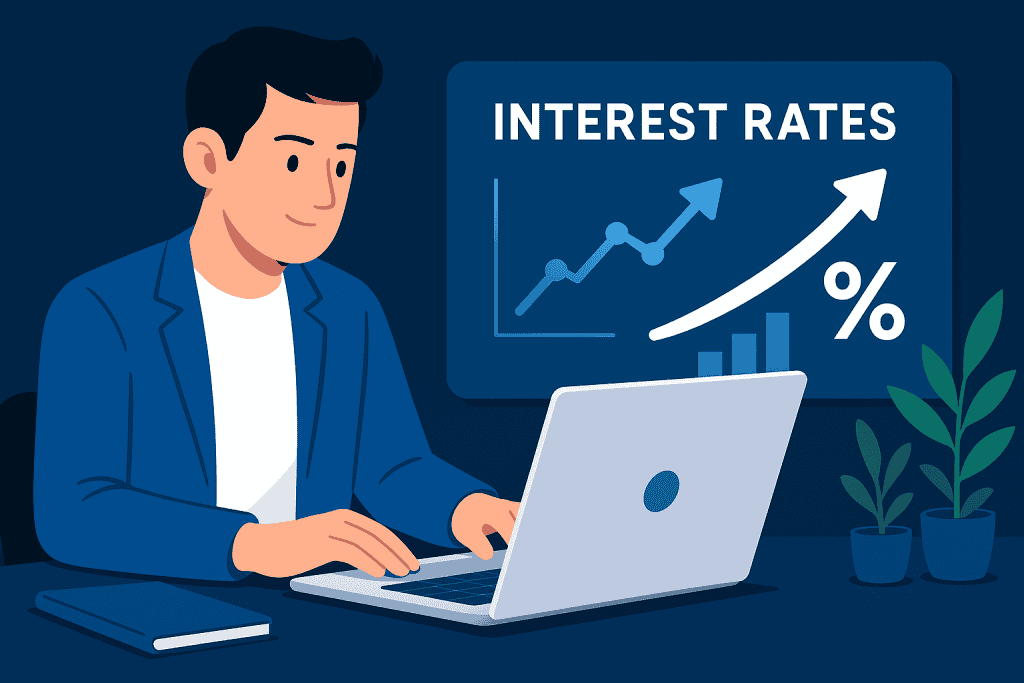
Have you ever wondered where projected interest rates in 5 years will be? If you’re planning for a home purchase, retirement, or just trying to make the most of your savings, understanding future interest rate trends can be a game-changer.
Interest rates affect everything—from your mortgage and credit card debt to your investments and savings. With economic shifts, inflation concerns, and global events shaping financial markets, being prepared is crucial.
In this guide, we’ll break down how projected interest rates in 5 years might change, what it means for your finances, and the best steps to take now. Whether you’re an investor, homeowner, or just someone trying to grow their savings, this roadmap will help you make informed financial decisions.
Materials or Tools Needed
Before we dive into planning for projected interest rates, here are some key tools and resources you might need:
| Material/Tool | Purpose |
|---|---|
| Financial news websites | Stay updated on market trends |
| Online mortgage calculators | Estimate future loan payments |
| Budgeting apps (Mint, YNAB) | Track expenses and savings |
| Investment portfolio tracker | Monitor stock and bond performance |
| Economic System reports | Analyze trends affecting interest rates |
Having these tools at your disposal can help you stay ahead of changes and adjust your investment plan accordingly.
Step-by-Step Guide on projecting interest rates in 5 years
1. Understand the Factors Driving Interest Rates
Interest rates don’t change randomly—they are influenced by a variety of factors. Here’s what drives them:
- Federal Reserve Policies – The Fed adjusts interest rates to control inflation and stimulate or slow down the economy.
- Inflation Trends – When inflation is high, central banks raise interest rates to control rising prices.
- Economic Growth – A booming economy can lead to higher interest rates as borrowing demand increases.
- Global Events – Wars, pandemics, and financial crises can disrupt markets, causing unpredictable rate shifts.
By keeping an eye on these elements, you can anticipate how projected interest rates in 5 years might impact your finances.
2. Review Your Loans and Debts
If you have loans with variable interest rates, it’s time to strategize.
- Mortgage Holders: If you have an adjustable-rate mortgage (ARM), consider refinancing to a fixed-rate loan while rates are still favorable.
- Credit Card Debt: Pay down high-interest debt now before rates climb, making payments more expensive.
- Student Loans: Look into refinancing options, especially if you have private loans.
Proactively managing debt now can save you thousands in interest over time.
3. Adjust Your Savings and Investment Strategy for your interest rates

Higher interest rates can affect how you invest and save. Here’s what to do:
- Savings Accounts – Interest rates on savings accounts may improve, so consider high-yield savings options.
- Stock Market Investments – Higher rates can slow market growth, so diversify your portfolio.
- Best Stocks to Buy – Focus on stocks that perform well in high-rate environments, such as financial or energy stocks.
- Bonds – If rates rise, bond prices drop, so consider shorter-term bonds to minimize risk.
4. Plan for Major Purchases Wisely
Thinking of buying a home, car, or making a large purchase? Consider these points:
- Mortgages: Lock in a low rate now before rates increase.
- Auto Loans: Rising rates can make car loans more expensive, so shop wisely.
- Business Loans: If you plan to start a business, securing financing now could be beneficial.
Timing big purchases with interest rate trends can save you money in the long run.
5. Stay Flexible and Keep Learning
Financial markets change constantly, and a rigid plan can set you back. Stay informed by:
- Following Economic Reports – Keep an eye on updates from the Federal Reserve and economic analysts.
- Adjusting Your Investment Plan – Be ready to shift funds between stocks, bonds, and other assets.
- Learning Trading Strategies – Higher interest rates can mean increased market volatility, so develop smart investment moves.
By staying informed and adaptable, you can navigate economic shifts with confidence.
Tips and Warnings
| Tip | Benefit |
|---|---|
| Lock in low fixed interest rates now | Saves money over time |
| Diversify your investments | Reduces risk in a fluctuating market |
| Increase your emergency fund | Helps with unexpected expenses |
| Stay updated on market trends | Enables informed decisions |
Common Mistakes to Avoid

- Ignoring Market Trends – Failing to stay updated on interest rate trends can lead to missed opportunities for refinancing or investing wisely.
- Overextending Debt – Taking on new loans without considering future interest rate hikes can make repayments unaffordable.
- Not Locking in Fixed Rate – Variable interest rates might seem appealing now, but they can skyrocket later.
- Neglecting Savings Adjustments – Rising rates can impact both borrowing and savings. Not adjusting your savings strategy means missing out on higher returns.
- Poor Investment Diversification – Relying too much on one type of investment, like stocks, can be risky if rates rise and the market crashes.
Making these simple adjustments can keep your finances on track despite changing economic conditions.
Conclusion
Sola Adesakin’s post emphasizes the importance of spending wisely, investing smartly, and preparing for financial stability in 2025, offering a flexible plan for individuals earning ₦500,000/month (or its multiples or fractions). This aligns perfectly on this which stresses the need for financial adaptability in response to projected interest rates in 5 years. Just as Adesakin suggests tweaking financial plans as needed, our guide encourages staying informed, adjusting investments, and managing debt proactively to ensure long-term financial security despite changing economic conditions.
The key is preparation—by taking proactive steps now, you can avoid financial pitfalls and make the most of changing market conditions. Stay informed, adjust your financial strategies accordingly, and plan wisely for the future.
FAQ
How do projected interest rates in 5 years affect my mortgage?
If rates increase, new mortgage loans will become more expensive. If you have an adjustable-rate mortgage, consider refinancing to a fixed-rate loan before rates rise.
What are the best stocks to buy in a rising interest rate environment?
Financial stocks, energy stocks, and companies with strong pricing power tend to perform well. Be cautious about tech and growth stocks, as they can struggle when rates go up.
Can a market crash happen due to rising interest rates?
Yes, a sudden increase in interest rates can cause a market downturn, especially in highly leveraged sectors. However, a well-diversified investment plan can help protect your assets.
Resources
- SmartAsset. 5-Year Financial Plan
- Investopedia. What is a Financial Plan?
- CNBC. Interest Rate Predictions for 2025
- X. Financial Planning
- YouTube. Financial Planning for 2025
